- Home
- Anne Stuart
The Catspaw Collection Page 4
The Catspaw Collection Read online
Page 4
Aiming the remote control, she settled back, reaching for her ice cream. If hot milk was supposed to help you sleep, cold cream should do almost the same thing, she thought righteously, digging in. Peter Sellers was on, the movie was just starting, and she settled back with pleasure to enjoy the travails of Inspector Clouseau. A moment later she sat back up, a low wail of anguish emitting through the Heavenly Hash.
“Oh, no!” she moaned, as a black-clad figure edged his way over the rooftops. She didn’t need a movie about a cat burglar, tonight of all nights.
Quickly she flicked through the channels. Talk shows, John Wayne war movies, Betty Grable musicals. Peter Sellers was unquestionably the cream of the crop. With a sigh, she turned it back to the Pink Panther, reaching for her ice cream again. Some of the chocolate had melted and spilled onto the sheet, and she made an ineffectual attempt at rubbing it away. She’d have to remember to sleep on the right side tonight.
Finishing the ice cream, she pushed the bowl under her bed and reached for the brandy, settling back to concentrate on the movie. Maybe she’d learn something about how to deal with Blackheart. Taking a contemplative sip, she let the liquor burn through the ice cream coating on her tongue, swirling it around with absentminded pleasure. And maybe Phillip would change his mind and rescue her before Blackheart stumbled any closer to the truth. Somehow she doubted either of those things would come to pass.
“A votre sante,” she toasted the good inspector, raising her brandy glass high. “And heaven help me.”
Chapter Four
THE ALARM RANG obscenely early. Ferris opened one eye, groaning as the sunlight beamed into her curtainless bedroom from the terrace. She fumbled around on the floor for her alarm clock, pulling back in disgust when her hand encountered the empty ice-cream dish. She had no choice—she opened the other eye and levered herself off the side of the wide bed to search for the recalcitrant alarm clock.
It was under an issue of Time Magazine at least six weeks old. How the magazine could have migrated over to cover the clock after she’d set it last night was beyond her imaginings, but she shrugged her shoulders, pulling herself upright with a weary sigh. She had long ago learned not to worry about what was where in her apartment.
There was one major blessing to this day. Nothing was going to be happening at Carleton House. It was Saturday, the ball wasn’t until the following Friday and the jewels weren’t due to arrive until Monday. The flowers had been argued over and ordered, the decorations planned, the security hired and left, thank God, to their own devices. The only duty she had to perform today, other than the onerous weekly task of mucking out the accumulated mess that was her apartment, was to run over to Carleton House and retrieve her briefcase.
Not that she’d forgotten it in the first place. She’d left it behind on purpose, part of her distrust of Blackheart extending to her personal papers. She loved Carleton House when it was still and silent, its cavernous rooms spacious and secure in wealth and status. She would wander through those rooms this afternoon and pretend she was Grace Kelly, cool and patrician, born to the purple.
As usual, the mess took longer than she expected. It was her weekend to do the full job, even taking a broomstick under the queen-size bed to roust out the dead panty hose, week-old Chronicles, empty boxes of Yodels, a silk blouse she’d thought she’d lost, and three Nikes, all for the left foot. She was a strange housekeeper, she thought as she washed the dirty dishes that had an amazing capacity for reproducing like rabbits. Like a secret eater, it was a case of binge and purge. Every night her clothes would be strewn over the apartment, the kitchen would be littered with every pot and pan, even when she utilized dear Mr. Stouffer’s concoctions, the papers and magazines grew in piles that threatened to topple over every available surface. And every morning she would wash the dirty dishes, straighten the piles, hang up all the clothes that hadn’t somehow snuck under the bed, just as she transformed herself.
At night she wore fuchsia silk kimonos, impossibly soft flannel nightgowns, skimpy French underwear, designer jockey shorts, anything that took her fancy, and her thick brown hair that was almost black hung in a wavy cloud around her face. In the morning she shrugged into her Armani and her Ralph Lauren suits, fastened her hair back in a loose bun, and became Ferris Byrd, young urban professional. It was an amazing creation, considering what she started out with, she mused. It was a shame no one but her sisters could appreciate it. And some of them were more offended than appreciative.
With a sigh she withdrew her hands from the sudsy water, letting it drain out of the tiny sink that could hold a service for one. It was fortunate that her messiness wasn’t downright dirtiness—if she ever got so lax as to let the dishes pile up for days, it would take her a month to wash them all.
Stripping off the chocolate-stained sheets, she tossed them in her overflowing hamper. Making the bed was her one holdout against compulsive cleaning. When she was gone all day, the only appreciative audience for a neatly made bed was Blackie, the peripatetic alley cat, and much as she loved the stubborn feline, that was going too far. The bed was made when clean sheets were put on it, and that was that.
And where was Blackie this morning? He’d been around just yesterday, demanding kitty gourmet goodies as she’d tried to dress for her fateful appointment at Blackheart, Inc. She should be used to his travels, occasioned by feline randiness or a case of the sulks. Blackie had very strict standards when it came to food and attention, and Ferris had fallen woefully short yesterday. It would take nothing less than creamed herring or his particular craving, overripe Brie cheese, to get him to forgive her.
With a sigh, she emptied a tin of Seafood Supper and set it by the open door to the terrace before getting dressed. Sooner or later he’d have to return, even if it meant settling for cat food. Blackie, like all good San Franciscans, was a true gourmet.
On the weekends, when Phillip was off on the early campaign trail and Ferris had no one to answer to, her wardrobe was more her own. Always keeping in mind that she might run into someone who mattered, she allowed herself jeans and sweaters, braided the thick hair in a loose plait that fell just below her shoulders, and returned to her Nikes, granted she could find a matching pair. She dressed that way now, in faded Levi’s rather than the Diesel jeans Phillip admired, leaving off the discreet gold jewelry that was her mark of caste. The apartment was clean, Phillip was out of town, and she was free, blissfully free.
She stifled the quick wave of guilt that washed over her. Neither she nor Phillip would want smothering togetherness. Any woman with a mind of her own would need time to herself. She wasn’t about to contemplate the unpleasant fact that she seemed to appreciate that private time more than she did the hours she spent with Phillip.
A reluctant grin lit her face as she sped her car along the drive toward Carleton Point. Blackheart had been so determined not to be fazed by her driving. She’d made strong men weep before, and no pleas or threats from Phillip had made her improve her headlong, headstrong pace. Her driving style was the one thing that still belonged to the twenty-nine-year-old woman who hadn’t been born Ferris Byrd, and she held onto it stubbornly.
The fog had lifted somewhat by the time she pulled up in the empty circular drive in front of Carleton House, but it was still a gray, chilly day, typical for late February in the Bay Area. She’d left her briefcase in the downstairs cloakroom, but she was in no hurry. Nothing much would be growing this time of year, but she was especially fond of the grounds anyway. The formal Japanese garden overlooked the Pacific, and she headed straight toward it, glad that she’d pulled a thick wool sweater on over the lighter cotton one. She shoved her hands in the pockets of her jeans, tucked her head into the stiff breeze and strode past the tall windows that overlooked the flagstoned terrace.
She never tired of looking at the ocean, even from a high perch like this one. The ever-changing variety of the ebb and swell of the
blue-green waves fascinated her, the never-changing vastness of it soothed her soul. A wide, four-foot-high stone wall separated the wide expanse of lawn from the rocky cliff beyond, and she leaned against the cool, damp stone, staring out dreamily into the windy day. There was a sleek yacht out there, slicing through the rough water with silken ease. For a long moment Ferris had the surprising wish that she were on it, sailing away from everything that surrounded her and weighed her down. And then she pushed away from the wall and headed back across the lawn to the French doors.
The ring of keys weighed close to five pounds, and it could unlock every single one of the thirty-seven outer doors of Carleton House. It took her twelve minutes to find the right one for the French door off the ballroom, another two minutes to rattle the rusty catch loose. And then she was inside, in her magic kingdom, with the wind and the constant hush of the ocean shut out behind her. With a sigh of pure satisfaction she surveyed the empty ballroom.
Ferris had fought the idea of using Carleton House for the Puffin Ball, fought it with all the considerable logic and wit at her disposal. Olivia Summers had been on the opposing side, determined that the Puffin Ball would take place nowhere but Carleton House. Ferris had been more than irritated when Olivia had prevailed, but that irritation had changed to delight when she first wandered through the old mansion. Her only wonder was that a cold-blooded bitch like Olivia Summers could appreciate it,
As a matter of fact, apart from the uncomfortable presence of Blackheart, Inc., Olivia Summers was the only cloud on her horizon. And she could thank Olivia for Blackheart, too. It was Olivia who’d first mentioned Blackheart’s name, eagerly seconded by Regina Merriam and voted by the Committee for Saving the Bay with an almost lustful enthusiasm. She supposed she couldn’t really blame Olivia; Blackheart was the obvious choice. He was society’s darling, his checkered past only adding to his desirability. She should have known any argument would have been quashed completely.
It still didn’t help her feelings toward Olivia. Granted, Olivia had once been engaged to Phillip herself, before breaking it off to marry Dale Summers, and Olivia had her own political aspirations, coveting Phillip’s senate seat with her blue, blue eyes. She never for one moment forgot that she was the granddaughter of Ezra McKinley, one of the founding fathers of the city, who was in turn the descendent of Abraham de Peyster, one of the founders of New York centuries earlier. Despite the fact that her family’s money had long ago run out, her indisputable blue blood, her racehorse-elegant body, her patrician bearing and WASP blond hair kept her firmly in the forefront of any social gathering. She also had brains, charm, ambition and a seeming regret that she had dismissed Phillip three years ago. Ferris hated her.
Olivia had always been unfailingly polite, and the blue-haired ladies doted on her, her peers vied for her attention and even Phillip seemed bemused in her presence. It seemed as if only Ferris could see the calculating look in those perfect blue eyes, could watch her clever manipulations with awe and dislike. Olivia Summers had the indisputable talent for making Ferris feel like an employee and the interloper she knew she was. It was all done with admirable subtlety—a tone of voice, a condescending smile, a graceful gesture. If and when Olivia did run for office, Ferris was determined to work for the opposition, even if it was some Tea Party fascist.
There was no hurry to get the briefcase. She’d tucked it down beside the radiator; it had doubtless survived the night and would survive a few more minutes. With her own careless grace, she sank down cross-legged in the middle of the empty ballroom floor. They were talking about white roses, Regina said. They’d do the gilt and rose-colored ballroom proud. With baby’s breath, and just a hint of pink somewhere . . .
“Fancy seeing you here,” Blackheart drawled from directly behind her, and Ferris screamed.
When she could breathe again she jumped to her full five feet four, never as tall as she would have liked, and her eyes were blazing. “Don’t you ever,” she said furiously, “do that again. Clear your throat, stamp your feet, fart, belch, I don’t care what. But don’t sneak up on me.”
Blackheart looked completely unmoved by her rage, and for a moment she could see why the combined force of the Committee for Saving the Bay had fallen beneath his spell. The black denims had been replaced by blue Levi’s so faded they were almost gray, and the khaki field shirt rolled up to reveal strong forearms made his brown eyes almost amber. Ferris had always had a deplorable weakness for field shirts, with their epaulets and their myriad pockets, and she had to steel herself not to react. He was wearing running shoes, which would account for his silent approach. Except that he’d been just as silent in leather boots.
“What were you doing, sitting there in the middle of the ballroom with that erotic expression on your face? I wouldn’t have thought a chilly room like this would arouse your fantasies.”
“They weren’t erotic fantasies,” she protested.
“I was watching you wandering around the gardens. You’re much more of a dreamer than I took you for, Ms. Byrd,” he continued in that low, warm voice of his. “You seemed so coldly practical yesterday. Today you look much more—” his hand reached out and gently tugged her braid “—much more human.”
She batted at his hand, but he’d already removed it. She didn’t like the phrase, coldly practical, but she was damned if she was going to call him on it. He just wanted a rise out of her, and she wasn’t about to give him that satisfaction. And then the meaning of his presence there in the deserted mansion struck her, and she cheerfully jumped to the attack.
“What are you doing here, anyway?” she demanded fiercely.
“My job.”
“How did you get in? The Carleton House security team was supposed to let me know if they gave out any keys.”
He smiled that devilish smile, and her heart gave a little moan at its remembered effect. “I didn’t need a key.”
Her lip curled. “Of course you didn’t. How could I have forgotten?”
The mockery bounced right off. “I asked about you,” he said conversationally, and immediately she was wary.
“I doubt you found out anything very interesting.” She managed an admirably cool tone of voice. “I haven’t led a very exciting life. Who did you ask?”
“Phillip, for starters.”
She didn’t like that phrase, “for starters.”
“He told me all about your glorious career at Stanford,” Blackheart continued, “your rapid rise to your position as his personal assistant, your wit and charm. I had to take his word on the latter, of course.”
“Of course.”
“And he told me the touching story of your life. How you were raised by your patrician aunt on Beacon Hill in Boston after your parents were killed in their private plane. How you excelled at the exclusive little boarding school but were always just a poor little rich girl who had to throw all her energies into her studies, missing the comfort a real family could offer. It was very touching.”
She held herself very still, hating him. “I’m sure you’re not about to offer your sympathy.”
His mouth quirked upward. It was an attractive mouth, she had to give him that, even as she longed to punch him in it. “And I’m sure you wouldn’t accept it if I was.”
“Very astute. What do you want from me, Blackheart?”
“You know, I rather like the way you say that,” he mused. “Most people call me Patrick.”
“Blackheart suits you.”
“What’s in a name?” he quoted softly, that devilish light in his eyes. “Ferris Byrd doesn’t suit you one tiny bit.”
“I like it,” she said stubbornly, refusing to give an inch.
“Of course you do. I’m finished for the day, Ferris Byrd. Let me take you out to dinner and I’ll pry all your secrets from you.”
“Go to hell.” She had turned to leave, consignin
g her briefcase to another night in the cloakroom, when his hand caught her arm. She had noticed the perfect beauty of his hands before; the gentle force on her arm burned the impression of it into her flesh. If she yanked, he would have released her. She stood still.
“Come away with me, Francesca,” he said, and his low, sweet voice was a silky caress along her nerve endings as he used her real name. “Your secrets are safe with me. I’ll even tell you a few of my own.”
“Blackheart,” she said, and she never thought she’d plead with any man, particularly this one. But she was pleading with him. “Let me go.”
Without a word, he dropped her arm. Without a word she turned and left him, her Nikes squeaking on the polished dance floor. She closed the French door quietly behind her, turned into the windy afternoon, and ran like hell, leaving Blackheart to stare after her, thinking God knew what.
NOW THERE WAS nothing left to do but wait till the Von Emmerling emeralds were delivered, thought the thief, wait that interminable length of time until the night of the Puffin Ball. It was a shame the old man had finished with the copies so soon. There was nothing left to do, nothing left to plan. Everything was ready, all that was needed was for the time to pass. And it was passing damnably slow.
The old man was right, the fakes were beautiful. They’d look stunning against a silky white neck. Their glow was almost luminous—there was no way the originals could be any more glorious. It was a shame the Werdegast emeralds would have to be sacrificed for state’s evidence. An ignominious fate for such craftsmanship, but now wasn’t the time to be sentimental. Too much was at stake, it had taken too long to get to this point, with this perfect opportunity. Rank emotion couldn’t be allowed to enter in at this late date.
The plastic bag with the emeralds was resting prosaically between the mattress and the box spring. So far it hadn’t interfered with a good night’s sleep. After all, “The Princess and the Pea” was nothing more than a fairy tale.

 Ice Blue
Ice Blue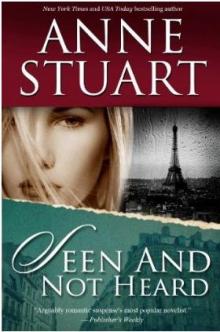 Seen and Not Heard
Seen and Not Heard Never Marry a Viscount
Never Marry a Viscount Heartless
Heartless The Devil's Waltz
The Devil's Waltz Hidden Honor
Hidden Honor Silver Falls
Silver Falls Fire and Ice
Fire and Ice Nightfall
Nightfall Never Trust a Pirate
Never Trust a Pirate The Soldier and the Baby
The Soldier and the Baby Still Lake
Still Lake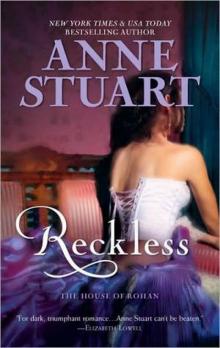 Reckless
Reckless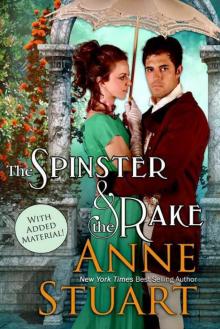 The Spinster and the Rake
The Spinster and the Rake Winter's Edge
Winter's Edge At the Edge of the Sun
At the Edge of the Sun Into the Fire
Into the Fire Night of the Phantom
Night of the Phantom Ritual Sins
Ritual Sins Darkness Before the Dawn
Darkness Before the Dawn Against the Wind
Against the Wind Ruthless
Ruthless The Catspaw Collection
The Catspaw Collection Escape Out of Darkness
Escape Out of Darkness The Widow
The Widow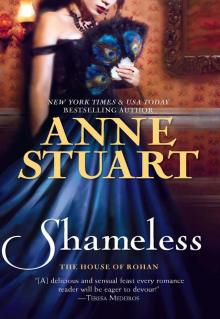 Shameless
Shameless Black Ice
Black Ice Breathless
Breathless Shadows at Sunset
Shadows at Sunset Falling Angel
Falling Angel Housebound
Housebound Cold as Ice
Cold as Ice The Wicked House of Rohan
The Wicked House of Rohan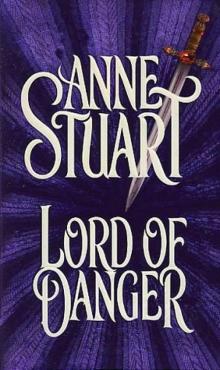 Lord of Danger
Lord of Danger The High Sheriff of Huntingdon
The High Sheriff of Huntingdon Wildfire
Wildfire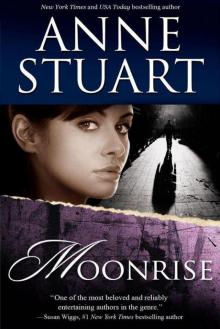 Moonrise
Moonrise The Demon Count's Daughter
The Demon Count's Daughter Date With a Devil
Date With a Devil To Love a Dark Lord
To Love a Dark Lord Driven by Fire
Driven by Fire Special Gifts
Special Gifts Ice Storm
Ice Storm Shadow Lover
Shadow Lover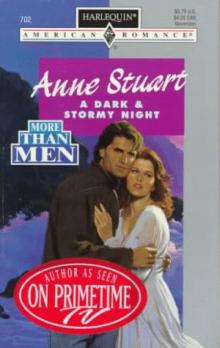 A Dark & Stormy Night
A Dark & Stormy Night Now You See Him...
Now You See Him...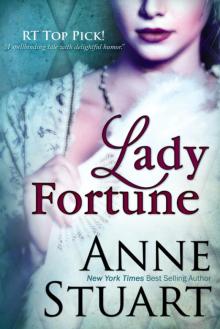 Lady Fortune
Lady Fortune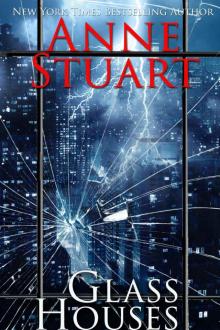 Glass Houses
Glass Houses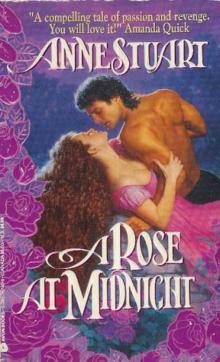 A Rose at Midnight
A Rose at Midnight Prince of Swords
Prince of Swords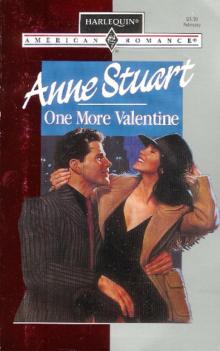 One More Valentine
One More Valentine Return to Christmas
Return to Christmas Tangled Lies
Tangled Lies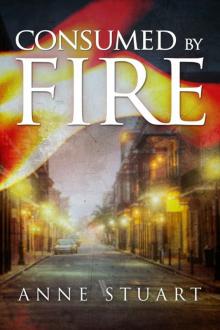 Consumed by Fire
Consumed by Fire The Fall of Maggie Brown
The Fall of Maggie Brown Wild Thing
Wild Thing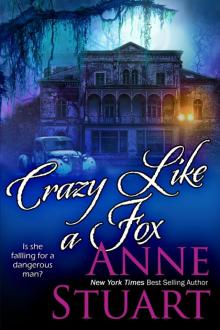 Crazy Like a Fox
Crazy Like a Fox The Demon Count
The Demon Count Prince of Magic
Prince of Magic Wildfire (The Fire Series Book 3)
Wildfire (The Fire Series Book 3)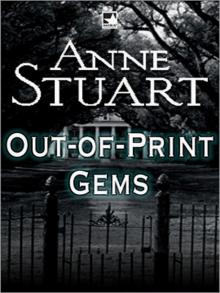 Anne Stuart's Out-of-Print Gems
Anne Stuart's Out-of-Print Gems Shadow Dance
Shadow Dance Under an Enchantment: A Novella
Under an Enchantment: A Novella Demonwood
Demonwood Blue Sage (Anne Stuart's Greatest Hits Book 3)
Blue Sage (Anne Stuart's Greatest Hits Book 3) Barrett's Hill
Barrett's Hill Angel's Wings (Anne Stuart's Bad Boys Book 5)
Angel's Wings (Anne Stuart's Bad Boys Book 5) Darkness Before Dawn
Darkness Before Dawn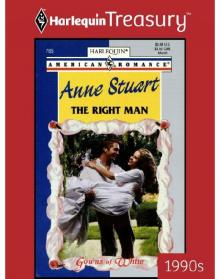 The Right Man
The Right Man The Houseparty
The Houseparty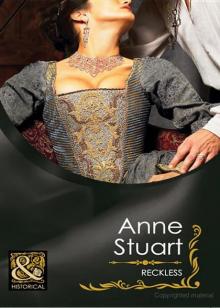 Reckless_Mills & Boon Historical
Reckless_Mills & Boon Historical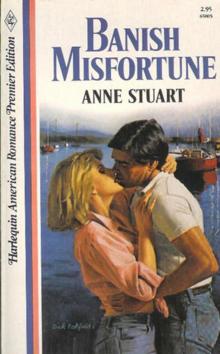 Banish Misfortune
Banish Misfortune Angel's Wings
Angel's Wings Chain of Love
Chain of Love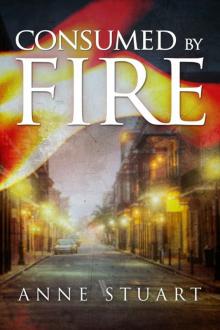 Consumed by Fire (The Fire Series)
Consumed by Fire (The Fire Series) Partners in Crime (Anne Stuart's Bad Boys Book 4)
Partners in Crime (Anne Stuart's Bad Boys Book 4) The Soldier, The Nun and The Baby (Anne Stuart's Greatest Hits Book 2)
The Soldier, The Nun and The Baby (Anne Stuart's Greatest Hits Book 2)